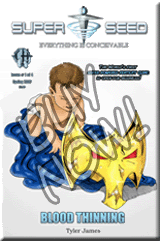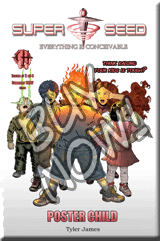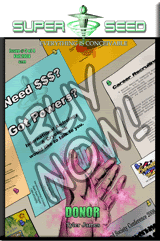 I've had several conversations recently regarding the process of storytelling and writing. Through those conversations, I've been able to reflect a fair amount on my own process, and thought I'd share it here.
I've had several conversations recently regarding the process of storytelling and writing. Through those conversations, I've been able to reflect a fair amount on my own process, and thought I'd share it here.First, a disclaimer. My writing "process" is constantly evolving. The way I'm approaching telling a story today, for comics or other media, is not the same approach I employed a year ago. And I expect my process will be somewhat different a year from now, as I hope to continue to evolve and develop as a story teller.
The current metaphor I've been toying with for my writing habits is that a writer needs to be a sponge. (Trust me. I'll explain.) So, over the next few weeks, I'm going to be outlining my writing process here on my blog. Writing these articles is helping me distill all of the things I've learned about writing over the past year. But I certainly hope some of this is helpful to you, my readers, as well. Shall we proceed?
I. The Great Idea
Really, all creative writing has to start with a great idea, that germ of a thought that makes you think, "You know someone really ought to write a story about this." All my projects started with a great idea. (And at this point, it's okay if your great idea isn't even all that great...as long as it interests you enough to pursue, that's a good start, and fits my definition of great here.)
All of my creative projects started with a great idea. For CounterTERROR, the great idea was simply, wow, "Breakfast at Tiffany's would be a good name for a chapter of a Zombie book that takes place in New York." I was watching the movie at the time, clearly paying a lot of attention to Audrey Hepburn. For Super Seed, the great idea was, "If people are willing to pay thousands for sperm from Ivy League grads or Olympic athletes, how much would they pay for sperm from super powered donors?" I'm guessing a whole lot. And all of the rest of my projects started similarly.
Here's the thing about great ideas...Everyone has them. And very few act on them. As a result, a great idea, in and of itself, to most people, is worthless. Ah, but to those with the drive to see it through, a great idea could be worth billions.
Let me illustrate.

There I was, a freshman in college. I'd met my new roommate and a ton of people on my floor, as well as a host of other new names and faces. Those first days were all pretty much a blur. But, then I got it. The Facebook! There, for my perusal (and later intense scrutiny and hours of study) was a neatly alphabetized album containing the pictures (mostly high school yearbook shots, but the occasional one of a guy posing with his tuba or a chick riding a horse) of all my new classmates. Along with the pictures, it listed their names, hometowns, and two interests. Pretty basic stuff. Still, from that point on, it was the ultimate reference guide to who I know and who I wanted to get to know. I recognized the value of this book quickly, as shortly after receiving it, a senior asked to borrow my copy and have a looksy at the new freshmen crop of ladies. To this day, I'm surprised I got it back.
Anyway, long story short, I remember sitting in my dorm room with a bunch of people and saying aloud, "They really should put this thing online, let you search people, and contact them through email. And you should be able to change your interests if you want." (I believe my interests were listed as football and personal training. Personal training? Yeah, very douchy. No offense to you personal trainers, of course.) I had that great idea, and I recognized it then as a great idea. This was 1997. And what did I do with this idea? Not a damn thing. And guess how many other people had this same idea? Not a clue, but probably a whole bunch.
But seven years later, a Harvard guy with a little more drive took that same basic germ of an idea and turned it into a company now valued at over a billion dollars, Facebook. Maybe you've heard of it.
So back to writing. You have your great idea. Sure, it's of no real value, but it is a big first step. You won't be writing a thing until you have a basic idea of what your story is about. So, you've got your idea. Now what.
(This is the sponge part.)
You need to get that idea out of your head and onto paper (or a computer screen, if that's how you roll.) There is tremendous value in getting things out of your head and into the world. Think about how much more likely you are to get something done if you write it down (pick up the dry-cleaning, buy more toilet paper, etc.) Studies have found that only 3% of people actually commit their life goals to paper. And guess what? Those 3% usually end up being far more successful than the 97% who keep their goals to themselves and in their head.
So, treat your brain like a sponge, block out a short period of time, and squeeze that great idea out of your head and into written form. If you've already started thinking of characters, or scenes, or plot points, or a line of dialogue, or whatever, yeah, get all of that stuff out there, too. Just get it all out, until you've got nothing left swirling around that brain of yours.
At this point, maybe you'll have filled up a notebook. Most likely you'll have a single page with a few words and a lot of white space. Either way, is okay. Take a deep breath, you've completeled the first step to telling your story.
Is taking this first step the hardest part. Hell, no. Like I said before, ideas are cheap. God has blessed us all with amazing minds. It's not unreasonable to think that every person on this planet might have at least one great idea every day of their lives. For you to write one down on paper shouldn't be that hard.
Nope, this first part is easy. But it's very important. You need to walk before you can run as the cliche goes, and the fact that you've gotten to this point is worth a small pat on the back. Because you've already done what 97% of the people in the world don't do. And that's honor your great idea enough to put it into words. Out of your head. Into the world. And the ball is rolling...
And guess what? The next step in the process is also very easy. At this point, you're now a dry sponge, ready to absorb some juice for your story. I'll talk about finding the juice and what to do with it next time.
NEXT: II. Research is Key











1 comment:
This is really cool, I look forward to getting more of a window into your process!
Post a Comment